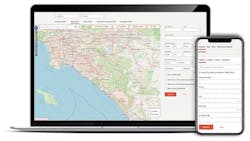PropTech Tools to Watch in 2023
Property technology, or PropTech, is changing the way people buy and sell their homes, and it’s also impacting the ways in which builders manage data and communicate with their clients. A recently released Q2 2023 Housing News Report from ATTOM revealed that nearly all homebuyers (97%) used the internet to guide their home search in 2021, and more than three quarters will be searching on their phone. The industry, from the consumer’s side to the contractor’s, is becoming more digital. And home professionals are following suit.
The 2021 “Real Estate in the Digital Age” Survey from the National Association of Realtors (NAR) found that 82% – 83% of real estate agents reported using digital software for tasks like generating comparative market analysis reports (CMA) and signing contracts, while 57% of agents said that daily use of social media apps helped them grow their businesses.
The evolving housing technology landscape has witnessed significant changes since the 2021 survey, mainly due to the impact of the COVID-19 pandemic and the development of new digital tools, which builders are also beginning to implement in their day-to-day business practices.
ATTOM highlights five proptech tools that are making waves in the residential sector in 2023:
Property Navigator
Local multiple listing services (MLS) have long been the industry baseline for gathering property data, but Property Navigator, a new product from ATTOM, makes that process much quicker and more efficient.
Property Navigator provides consistent property data reports, covering over 155 million properties in the United States, equating to 99% nationwide coverage. It uses “300 distinct data points, including occupancy, equity, default status, and lender,” reads the report, “while also providing phone numbers associated with properties for even better targeted marketing and easy communication. Plus, it helps determine property values based on multiple automated valuation models (AVM) and compiles all of that information into consistent and presentation-ready property reports that can be downloaded at a moment’s notice.”
Along with helping housing professionals zero in on new listings, Property Navigator can also help developers locate and track profitable markets as well as provide valuable lot information, like details on size and zoning.
ATTOM's Property Navigator speeds along the process of gathering property data.
Image: ATTOM
Chatbots and AI Generative Tools
Generative AI tools like ChatGPT Plus allow housing professionals and home builders to generate marketing copy easily. These tools gather data from the internet and create computed responses for slogans, email text, blog posts, social media captions, and more.
Certain advancements in the field, namely chatbots, are slowly but steadily being implemented into daily business operations to reduce workload for real estate and home building companies, an especially crucial benefit amid a worsening labor shortage which saw more than 50 million workers quit their jobs in 2022.
Tools like ChatGPT are becoming increasingly popular as a time-saving tool for builders looking to produce marketing content quickly and efficiently.
Image: irissca / Stock.adobe.com
Digital Housing Assets
The advent of widely available, truly immersive virtual-reality platforms, like the Metaverse,, enables housing professionals to expand their differentiators to include digital assets. For instance, along with in-person tours and open house visits, residential professionals, including builders and remodelers, can now offer things like virtual walkthroughs of construction sites or home renderings, which may also help contractors expand their market to clients that aren’t local.
This emerging market offers opportunities for investment at a lower price point, providing a potential source of income and bridging the gap between virtual and physical worlds to reach a wider audience that also includes out-of-state buyers unable to visit a new listing or new-construction project in person.
Enhanced Data Management
Traditional data management requires continued, manual updating and record keeping by residential contractors. It’s a process that can require a lot of time and organization, but cloud-based, automated data management significantly reduces that time and labor by continuously logging and updating information as it’s entered.
With cloud data management, records can be shared across private and public clouds with increased security. Also convenient for professionals working from home is the accessibility of all data stored within the cloud, which can be opened, edited, and transferred from anywhere in the world at any time.
In addition, most cloud providers automatically back up data and handle all required maintenance, including replacing failed hard disks, performing hardware refreshes, or installing firmware updates.
Blockchain Technologies
A blockchain is a type of distributed database or immutable ledger that facilitates the process of recording transactions and tracking assets. It takes recordkeeping out of the hands of local authorities to reduce the risk of human error and provide more transparency.
According to ATTOM, new platforms like Lisk offer the ability to create unique blockchains and utilize blockchain for secure property data sharing, rental payments, and document storage. That ledger is then shared among a computer network, but users can create unique blockchains of their own.
A blockchain, in simple terms, is a chronological chain of transaction data that’s difficult to hack. In the real estate sector, blockchains have given rise to smart contracts, which allows renters and buyers to sign documents and view records virtually, speeding up the selling or buying process and granting consumers 24/7 access to all of their real estate documentation and transaction history.


